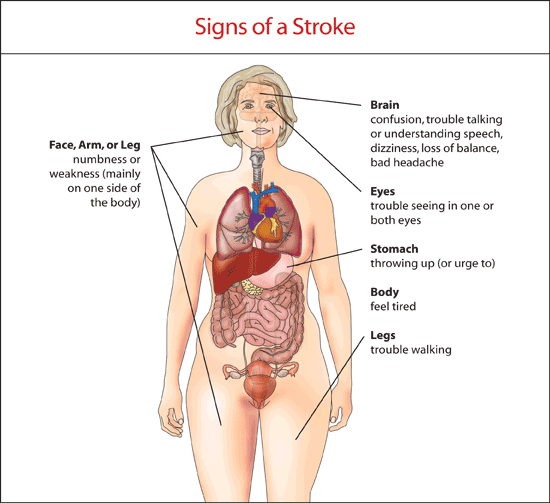Signs of a stroke
A stroke happens when part of your brain doesn't get the blood that it needs. It is sometimes called a "brain attack." This is because, like a heart attack, a stroke causes a lack of blood flow. Without blood, your brains cells will start to die within minutes. A stroke is very serious and you should get to the hospital right away by calling 9-1-1. Learn what to expect at the hospital when you're having a stroke.
Strokes happen fast. Some of the most common signs are sudden numbness or weakness on one side of the body, confusion, and trouble walking or speaking. See the figure, "Signs of a Stroke," for a full list of stroke signs.

If you have stroke signs that don't last long, you might have had a "mini-stroke." These small strokes — called a transient ischemic attack (TIA) — may not last long, but they still require treatment. Also, a TIA could be a sign that you are about to have a major stroke. "Mini" or not, these symptoms are an emergency.
If you have or see someone having any stroke symptoms, call 911 right away. Every minute counts! Current stroke treatments can raise the chances of recovering with few or no disabilities. But you must get help right away. These treatments will work only if you get them no later than three hours after your symptoms began. Do not drive yourself or let a friend drive you. You may need medical help on the way to the hospital. Paramedics are trained to treat you on the way to the emergency room.
If you're having a stroke, you may not be able to call 911. In fact, you may not even be able to move or talk! In most stroke cases, it's a family member, coworker, or other bystander who calls 911. That's why everyone should know the signs of stroke and how to react.
The hospital you go to can really matter. You have a better chance of having a good outcome if you're taken to a certified stroke center. They have the staff, equipment, and experience need to treat stroke quickly and correctly. Find the nearest certified stroke center, and give the name and address to your family or caregivers. Tell them that if you have a stroke, you want to be taken to that hospital. Even if you live in a rural area, emergency personnel might be able to take you to a certified center by helicopter.
More information on signs of a stroke
Read more from womenshealth.gov
-
Stroke Fact Sheet — This fact sheet answers questions about stroke, including information about warning signs, effects, and risk factors.
http://www.womenshealth.gov/publications/our-publications/fact-sheet/stroke.cfm
Explore other publications and websites
-
Cardiovascular Disease: Stroke (Copyright © HeartHealthyWomen.org) — This publication explains the two different types of strokes: ischemic and hemorrhagic. It also talks about the signs and symptoms of transient ischemic stroke (TIA), or "mini strokes."
http://www.hearthealthywomen.org/index.php?view=article&id=581
-
Know Stroke. Know the Signs. Act in Time. — This publication features information on what a stroke is, the signs and symptoms of stroke, and what can be done to prevent a stroke.
http://www.ninds.nih.gov/disorders/stroke/knowstroke.htm
-
Warning Signs of Heart Attack, Stroke, and Cardiac Arrest (Copyright © American Heart Association) — The American Heart Association encourages everyone to learn how to respond quickly to a heart emergency. This website reviews the warning signs of a heart attack and stroke and explains what actions to take to in a heart emergency.
http://www.heart.org/HEARTORG/Conditions/HeartAttack/WarningSignsofaHeartAttack/Warning-Signs-of-a-Heart-Attack_UCM_002039_Article.jsp
-
Women and Stroke: Unique Symptoms in Women (Copyright © National Stroke Association) — Women can experience stroke symptoms differently than men. This fact sheet describes these unique symptoms and provides guidelines on how to act "F.A.S.T." and respond to an emergency situation.
http://www.stroke.org/site/PageServer?pagename=WOMSYMP
Connect with other organizations
-
American Stroke Association
http://www.strokeassociation.org
-
National Heart, Lung, and Blood Institute
http://www.nhlbi.nih.gov/index.htm
-
National Institute of Neurological Disorders and Stroke, NIH, HHS
http://www.ninds.nih.gov/
-
National Stroke Association
http://www.stroke.org/site/PageNavigator/HOME
Content last updated February 1, 2009.
Resources last updated February 1, 2009.
womenshealth.gov
A federal government website managed by the Office on Women's Health in the Office of the Assistant Secretary for Health at the U.S. Department of Health and Human Services.
200 Independence Avenue, S.W. • Washington, DC 20201


 Text size
Text size Email
Email
